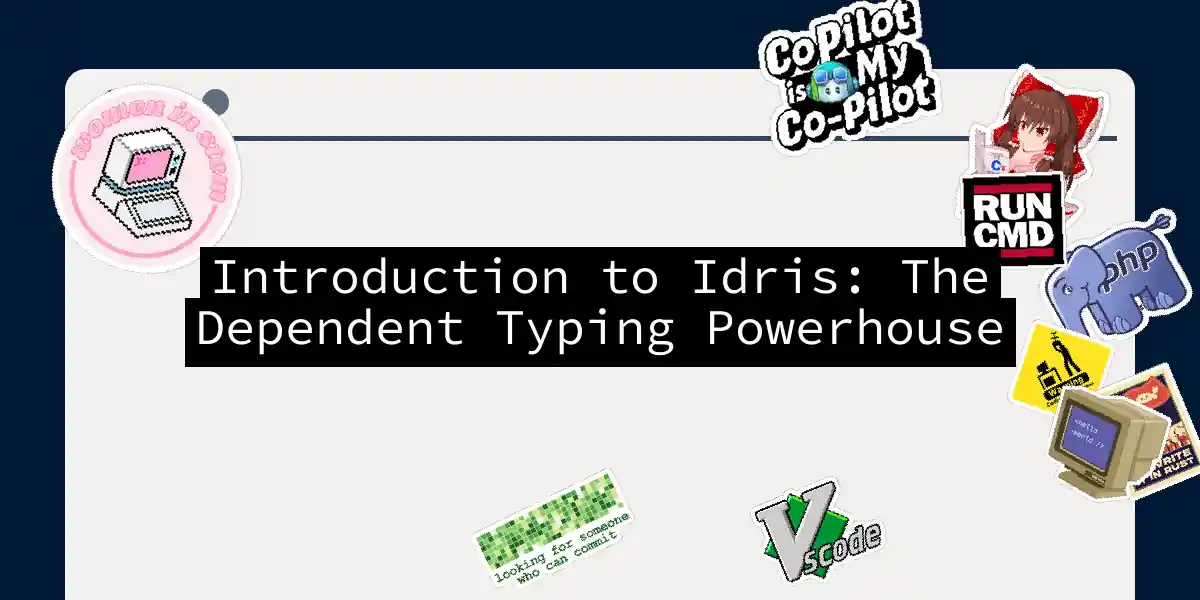Welcome to the World of Idris
If you’re a software developer with a taste for the exotic and a passion for precision, then you’re in for a treat. Today, we’re diving into the fascinating world of Idris, a functional programming language that’s not just about writing code, but about proving its correctness with the help of dependent types.
What is Idris?
Idris is a general-purpose, purely functional programming language that was first introduced in 2007 by Edwin Brady. It boasts a Haskell-like syntax but with the added power of dependent types, making it a unique blend of programming and proof assistants like Coq and Agda.
Dependent Types: The Magic Behind Idris
Dependent types are the heart and soul of Idris. In simple terms, a dependent type is a type that depends on a value. For instance, imagine a type that describes an (n)-tuple of real numbers; this type is dependent on the value of (n).
Example: Vectors with Static Length
Let’s see how this works in practice with an example. In Idris, you can define a list with a static length, often called a vector, using dependent types:
data Vect : Nat -> Type -> Type where
Nil : Vect 0 a
(::) : (x : a) -> (xs : Vect n a) -> Vect (n + 1) a
Here, Vect is a type that depends on two parameters: a natural number Nat and a type Type. This allows you to create lists of a specific length, which is enforced at compile time. For example, Vect 3 Int would be a list of exactly three integers.
Functional Programming in Idris
Idris is deeply rooted in functional programming principles. Here’s a simple “Hello, World!” program to get you started:
module Main
main : IO ()
main = putStrLn "Hello, World!"
Notice the single colon in the function signature and the absence of the where keyword, which are slight deviations from Haskell syntax.
Recursive Data Types
Idris supports recursive data types, which can be defined in a traditional Haskell-like syntax or using Generalized Algebraic Data Types (GADTs):
data Tree a = Node (Tree a) (Tree a) | Leaf a
-- Using GADT syntax
data Tree : Type -> Type where
Node : Tree a -> Tree a -> Tree a
Leaf : a -> Tree a
Automatic Proof and Verification
One of the most compelling features of Idris is its ability to perform automatic proof and verification. This is where dependent types really shine. You can use Idris to prove properties about your programs at compile time, making it a powerful tool for ensuring the correctness of your code.
Example: Proving Properties
Here’s an example of how you might define a function that ensures its arguments satisfy certain properties:
plusCommutes : (x : Nat) -> (y : Nat) -> x + y = y + x
plusCommutes Z y = Refl
plusCommutes (S k) y = cong S (plusCommutes k y)
In this example, plusCommutes is a function that proves the commutative property of addition for natural numbers. The Refl and cong functions are used to construct the proof step-by-step.
Using Idris as a Proof Assistant
Idris can be used in a way similar to proof assistants like Coq. You can write tactics to automate the proof process or develop proofs step-by-step.
Tactics and Proof Development
Here’s a brief example of how you might use tactics in Idris:
lemma : (x : Nat) -> (y : Nat) -> x + y = y + x
lemma x y = ?hole
-- Using a tactic to fill the hole
lemma x y = proof
intros
induction x
- refl
- rewrite IHx
rewrite plusSuccRightSucc
refl
In this example, the proof tactic is used to fill in the proof step-by-step, using other tactics like intros, induction, and rewrite to guide the proof process.
Flowchart: Idris Development Process
Here’s a flowchart to illustrate the Idris development process, including the use of dependent types and proof verification:
Conclusion
Idris is more than just a programming language; it’s a powerful tool for ensuring the correctness and reliability of your software. With its support for dependent types and automatic proof verification, Idris offers a unique blend of programming and formal verification that can significantly enhance the quality of your code.
Whether you’re a seasoned developer looking to explore new frontiers or a newcomer to functional programming, Idris is definitely worth a closer look. So, dive in, and let the dependent types guide you towards writing more robust and reliable software. Happy coding
